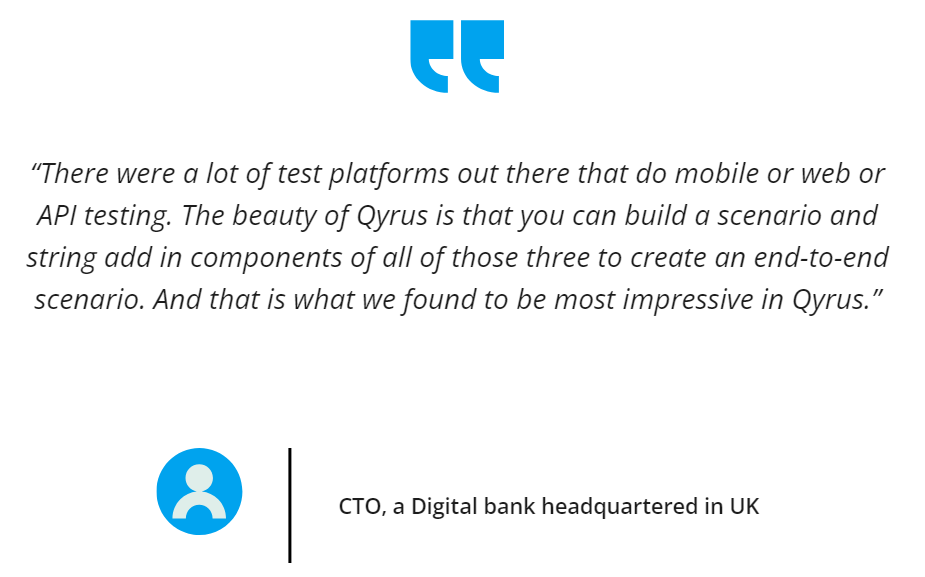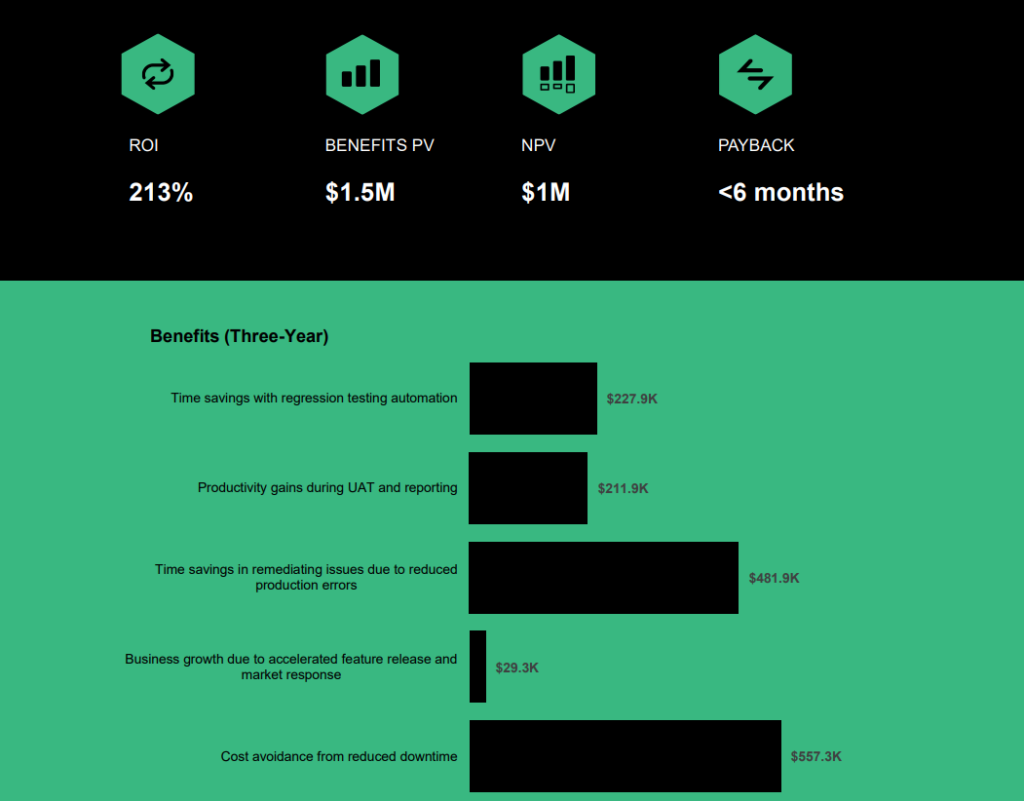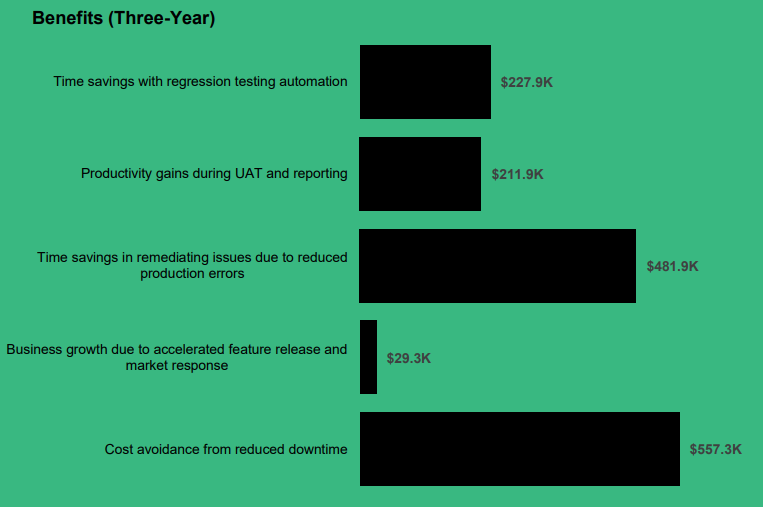Accelerate IT operations with AI-driven Automation
Automation in IT operations enable agility, resilience, and operational excellence, paving the way for organizations to adapt swiftly to changing environments, deliver superior services, and achieve sustainable success in today's dynamic digital landscape.
Driving Innovation with Next-gen Application Management
Next-generation application management fueled by AIOps is revolutionizing how organizations monitor performance, modernize applications, and manage the entire application lifecycle.
AI-powered Analytics: Transforming Data into Actionable Insights
AIOps and analytics foster a culture of continuous improvement by providing organizations with actionable intelligence to optimize workflows, enhance service quality, and align IT operations with business goals.
“Did you know? According to Adenza, the use of CATT can decrease test execution times by up to 70%”
The recent hype about implementing agile software solutions has improved the design and development efforts, but there is still an evident backlash when it comes to testing them. Technology leaders in companies have been working tirelessly to bring IT projects back on track. Adopting new approaches is the only way forward because based on the current market demands the current development cycles and testing methods are not sustainable.
To validate the statement that automating testing processes is essential to help scale software development, Forrester conducted a study by interviewing two representatives from an organization with experience using the Qyrus automation tool and comparing it against traditional manual testing methods.
The analysis showed that post-implementation customers could project a staggering 213% ROI projected over three years. But what metrics were measured in Forrester’s study that could assess the impact of automating the testing process?
In this blog, we’ll break down how Qyrus helped organizations streamline their testing, cut costs, and improve software delivery.
The Problem with Traditional Testing Methods
Being crystal clear on your goals and objectives makes all the difference, Forrester conducted a Total Economic Impact study to measure the benefits and costs to determine the effect of integrating technology in an organization. It is a method to understand the ROI realized and is determined by the level of fulfilment provided by the solution.
In the study, it was found that organizations with manual testing efforts were struggling to make ends meet due to prolonged development cycles. With each new release or update, the testing time increased which was not beneficial as time and resources were diverted from both testing and business users. Teams in lending, client servicing, and savings were majorly affected as they had to accommodate the growing testing requirements. As a result, productivity suffered, and key projects deliverables were always facing delays, putting pressure on the entire development process.
The Qyrus solution
To address these challenges, the organizations turned to Qyrus, and the results were quite promising. Qyrus is not just a replacement for manual testing; it redefines the entire testing process with its advanced automation capabilities. Forrester’s study highlights how organizations using Qyrus were able to streamline their testing processes, improve quality assurance, and boost productivity.
- High Automation Coverage: Qyrus automated 550 test cases, covering 90% of mobile app and web testing.
- Codeless Automation: The platform’s codeless functionality allowed organizations to build and execute end-to-end test scenarios without needing extensive programming knowledge.
- Cross-Platform Testing: By seamlessly linking mobile, web, and API tests, Qyrus provided comprehensive insights into user experiences across platforms.
These capabilities didn’t just enhance testing efficiency—they fundamentally improved the quality of the software being developed. The ability to maintain regression testing with greater accuracy allowed teams to confidently release updates, knowing that all critical functions were performing optimally.
The Cost and Flexibility Impact
By automating their testing use cases with Qyrus, the interviewed organizations experienced a significant reduction in their User Acceptance Testing (UAT) cycles. The tasks that previously took eight to ten weeks were now completed in just three weeks. Initially, the organizations were spending around 25% of their time on UAT testing processes, post-automation, it dropped to just 5%.
The automation also helped modify UAT into a training ground for business users. It allowed teams to quickly update standard operating procedures and operational documentation with new features. As Qyrus took care of the UAT processes with automation, productivity increased – enabling teams to manage the operational aspects of new releases more effectively and ensuring everyone was aligned on the latest updates.
Additionally, these organizations had to generate an average of 48 reports to track UAT testing progress; again, compiling each report took about an hour. With Qyrus’ dashboard functionality, it simplified the reporting process, reducing the time spent creating a report from one hour to just ten minutes. This efficiency not only streamlined reporting but also provided teams with real-time insights into testing progress and outcomes, improving their ability to make informed decisions quickly.
From a financial perspective, the time saved through automation directly translated into significant cost savings. By comparing the costs saved versus the costs spent on manual labour, the organizations potentially between $88,246 and $95,520 annually, resulting in a three-year total savings of $275,577 and a present value of $227,866. The main aspect lies in future, the automation improvements year-on-year will continue to reduce working hours, as automation will be more efficient and smart replenishing 50% of the previously lost time.
Source: The Total Economic Impact™ Of The Quinnox Qyrus Solution
1. Time Savings in Remediating Issues Due to Reduced Production Errors
The organizations experienced a decrease in production errors, leading to considerable time savings in issue remediation. Automated testing helped in early detection of defects, catching issues before they reached the production environment.
This minimized the number of bugs and reduced the time spent on fixing them. As a result, development teams were left with more time to focus more on building new features rather than constantly troubleshooting and resolving errors, significantly enhancing overall efficiency.
2. Business Growth Due to Accelerated Feature Release and Market Response
Qyrus helped these organizations to accelerate their feature release cycles, faster releases meant the organizations could act more swiftly based on market demands and customer feedback. This helped drive better user engagement and satisfaction, directly contributing to business growth and increasing their capacity to capture market opportunities.
3. Cost Avoidance from Reduced Downtime
By automating testing and ensuring more reliable code, the likelihood of major production issues was greatly reduced. Fewer production errors translated into less unplanned downtime, which not only saved costs associated with emergency fixes and lost productivity but also safeguarded the organization’s reputation. Maintaining high system availability and reliability helped avoid the financial impact and customer dissatisfaction that typically accompany prolonged downtimes.
While these benefits are substantial, Forrester’s analysis also considered the potential risks, such as fluctuation in fully burdened FTE hourly rates and time estimates for UAT and reporting. To account for these uncertainties, Forrester adjusted the benefits downward by 10%. Even with this adjustment the three-year, risk-adjusted total present value of the savings stood at $212,000.
Understanding the Total Economic Impact™ Study

Key Findings from the TEI of Qyrus Study: A Closer Look
Key Findings from the TEI of Qyrus Study: A Closer Look
Forrester’s TEI framework can help organizations evaluate the impact of a testing solution like Qyrus by examining four key areas: cost, benefit, flexibility, and risk. This end-to-end approach ensures that all potential impacts are considered, providing a clear picture of the return on investment.
- Cost: Implementing an advanced testing platform incurs costs, including licensing, integration, and ongoing management. However, the time savings and efficiency gains achieved through automation can offset these costs. For example, the reduction in manual testing efforts and the streamlined reporting process can lead to significant productivity gains. With average fully burdened hourly rates for software developers and QA testers at $55 and $36 respectively, these efficiencies translate into substantial cost savings.
- Benefit: The primary benefit of a solution like Qyrus is its ability to maintain high quality and reliability in software products. By reducing defects and minimizing incidents, organizations can improve product stability and customer satisfaction. The TEI report showed that Qyrus reduced defects and incidents by up to 80%, highlighting its effectiveness in delivering high-quality outcomes.
- Flexibility: A flexible testing platform is crucial for adapting to changing business needs. As organizations scale or shift their focus, the ability to quickly adapt testing processes is vital. Qyrus provides this flexibility, allowing companies to tailor their testing approaches to meet specific requirements without sacrificing efficiency or quality.
- Risk: Every investment comes with risk, but advanced testing platforms help mitigate these risks by identifying potential issues early. By catching problems before they reach production, Qyrus helps prevent costly downtime and protects the organization’s reputation. The time savings in incident fixes, as highlighted in the TEI report, further emphasize how proactive issue detection can lead to fewer disruptions and more stable operations.
- Cost Avoidance from Reduced Downtime: Qyrus’s AI-driven detection capabilities prevent 50% of incidents from entering production, leading to cost savings of $557,000 by avoiding downtime.

The Strategic Advantage of Qyrus
Qyrus exemplifies how an advanced testing platform can transform an organization’s approach to software development. The TEI report on Qyrus highlighted several areas of impact:
- Facilitating Growth and Innovation: By optimizing testing processes, Qyrus frees up resources that can be redirected towards innovation. This is crucial for organizations looking to stay competitive and capitalize on new opportunities. The ability to quickly and efficiently bring new features to market allows businesses to respond to customer needs and industry trends, driving growth and long-term success.
- Improved Business Growth and Market Response: Qyrus contributes to broader business objectives, particularly in terms of growth and market agility. Faster time-to-market capabilities allow organizations to be more responsive to market trends and customer feedback, providing a significant competitive advantage. Consistently delivering high-quality products and responding swiftly to customer needs enhances customer satisfaction and loyalty, driving revenue growth and opening new revenue streams.
3. Advanced Reporting and Analytics
Wrap Up
The Forrester study illustrates the immense value that automating testing processes with Qyrus can deliver. By reducing manual testing efforts, accelerating release cycles, and driving down operational costs, Qyrus enables organizations to achieve significant ROI while improving the quality and performance of their software.
The study also calculated the additional costs such as implementation costs, service fees, FTE costs, and management/training costs. This showed that automation testing is a better approach to incentivize the gains that can provide good returns to the organization. Even with tracking mechanisms in place the real financial impact of intelligent resource allocation and smart testing methods is often neglected. Qyrus has the right skills and technological infrastructure to drive business improvements which helped the interviewed organizations achieve a net present value (NPV) of $1 million and an ROI of 213%.
Are you ready to transform your testing processes? Download the full Forrester TEI Report on Qyrus and discover how automated testing can deliver impressive returns for your organization.
Get in touch with us today!
